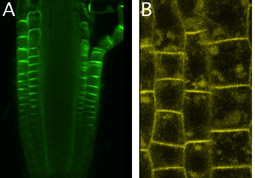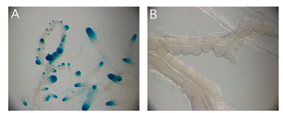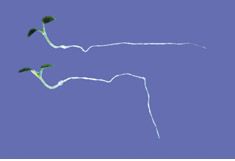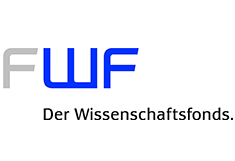Christian Luschnig
Molekulare Mechanismen des Pflanzenwachstums
Gebiet
Gebiet
Pflanzliche Entwicklungsbiologie, Wachstumsregulation, Pflanzenhormone
Leiter: Assoc. Prof. Mag. Dr. Christian Luschnig
Ausrichtung
Plants as sessile organisms had to develop an amazing repertoire of mechanisms that allows them to sense and to respond to environmental challenges, resulting in the plant’s adaptation to an altered environment. The plant hormone auxin has a quite general role in plant growth and development, and was also demonstrated to be involved in numerous adaptive growth responses. Remarkably, auxin appears to be the only growth regulator that is actively transported throughout the entire plant body to create complex variations in concentration patterns and flow directions over time. We try to elucidate the complex interplay and control of factors that ultimately underlie the observed spatiotemporal variations in auxin distribution and its consequences for adaptive growth responses.
Projekte
Control of PIN expression
PIN proteins represent a plant-specific family of membrane proteins that mediate directional transport of the plant growth regulator auxin, thereby affecting a multitude of developmental processes and growth responses. A key role in the control of auxin transport has been attributed to the localization of PIN proteins, since regulators of PIN localization and intracellular trafficking were found to influence plant development in general and directionality of auxin transport in particular.
We study post-translational modifications of PIN proteins, which serve as signals in the control of protein localization and degradation, and their regulatory implications for auxin distribution and growth responses. In addition, a number of trans-acting determinants of PIN protein levels and expression are characterized by cell biological and biochemical approaches. Overall, this work should provide us with insights into crosstalk between developmental programs and environmental stimuli that affect adaptive growth responses via control of PIN protein fate.

Fig. 1 A) Polar distribution of PIN2 (green signal) in an Arabidopsis root tip determines the direction of auxin transport. B) Intrinsic and environmental cues may trigger alterations in subcellular PIN2 localization (yellow signal), which are believed to affect polar auxin transport.
Auxin-mediated control of cell proliferation and organogenesis
Plant development is characterized by a remarkable post-embryonic flexibility in the control of growth rates and organ formation. Unlike animals, which undergo pattern formation following a pre-determined morphogenetic blueprint, plant development continuously responds to variations in environmental parameters. These variations lead to modifications in morphogenetic programs, ultimately resulting in adaptive growth responses. Auxin acts as a positional signal essential for the control of cell proliferation and organ initiation.
We analyze components of the Arabidopsis chromatin-remodeling machinery and their involvement in the hormonal control of cell proliferation. This should reveal as to how auxin signals could influence activity and/or composition of protein complexes required for posttranslational modifications of chromatin components and their role in the interpretation of positional signals in plant development.

Fig. 2 A) Auxin triggers the formation of numerous lateral roots expressing a cell cycle reporter gene fusion (blue staining). B) In some chromatin remodeling mutants auxin-induced lateral root formation is impaired, which correlates with deficiencies in the expression of some core cell cycle regulators.
Publikationen
Förderungsorganisationen
Kooperationen
In recent years our group published together with the following groups:
Andreas Bachmair, MFPL; Vienna, Austria
Jiri Friml, IST; Klosterneuburg, Austria
Eva Zazímalová, Institute of Experimental Botany, ASCR; Praha, Czech Republic


